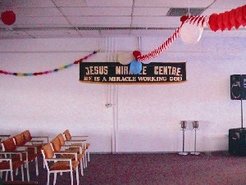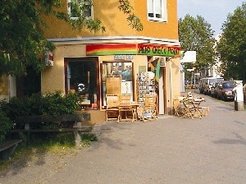Ghanaians in Germany – transnational social fields and social status


Ghana has become one of the major African countries of migration to Western Europe and North America over the last 40 years. Stimulated by economic and social crises from the late 1960s to the end of the 1980s, many Ghanaians left the country to look for better opportunities abroad. Although most Ghanaian migrants live in African countries, during the 1980s and 1990s significant Ghanaian populations emerged in Great Britain, Canada, the USA, Germany, the Netherlands and Italy. Ghanaians make up one of the biggest sub-Saharan African populations in Western Europe (Ter Haar 1998). According to official figures, more than 23 000 people with a Ghanaian passport live in Germany today.1 The great majority of Ghanaians came between the late 1970s and the early 1990s. During this time, Germany was relatively attractive for migrants claiming asylum because of its relatively liberal procedures and its labour opportunities. After 1993 the inflow of Ghanaian migrants was reduced significantly by the restrictive migration policy implemented by the German government. Over the last decade, the large majority of the Ghanaians have secured their legal status. A 'localising process' has started which expresses itself in the form of family foundation, the emergence of afro-shops and Ghanaian initiated churches. Ghanaian migrants' life-worlds with their own institutions have emerged in many larger German cities.
From ‘Brain Drain’ to ‘Diaspora’ – Paradigm shift in the discourse on migration in Ghana
In the 1990s, it was estimated that between 10 and 20 percent of Ghanaian citizens were living abroad (Peil 1995: 365), which would correspond to between two and four million people based on the current size of the Ghanaian population. In particular, it was qualified people such as teachers, engineers, nurses and doctors who left the country, which had a negative impact on its economic and social system. But migration also has a positive effect on Ghanaian society. As in other emigration countries, remittances of and trade relations with migrants have become more and more important for the economic development of Ghana and the well-being of many families. One indicator of the importance of Ghanaian migrants for their homeland is the volume of remittances.
In 2000, it was estimated that the value of remittances came to between $300 and $400 million.2 After cocoa, gold and tourism, remittances are the fourth largest source of foreign exchange.3 The economy of Ghana is dependent on this financial input. The importance of the relatively wealthy migrants in the 'diaspora' and the need to strengthen their attachment to the home country has been recognised by political and social elites in Ghana: the patriotism of Ghanaians abroad should be used as a resource for 'developing' the country. In the context of a policy of inclusion, Ghanaian politicians and some of the so-called traditional authorities have started to travel quite frequently to meet 'their people' abroad. These acts of including the Ghanaians abroad are a symbolic statement: all Ghanaians, in Ghana and abroad, should participate in the 'Ghanaian development project'. In this respect, Ghana has become a deterritorialised nation-state. After independence in 1957, the official political doctrine was that Ghanaians are the people living in Ghana. Now it seems to have been reversed; Ghana is wherever Ghanaians live. The discourse about migration has changed significantly. In the 1980s it was dominated by brain drain. Migrants were officially perceived as people leaving their country in the lurch in difficult times. Additionally, the fact that these migrants were claiming asylum in other countries was perceived as shameful for the country and migration acquired connotations of political opposition. Now, the dominant policy of inclusion is accompanied by a nationalist discourse that regards migration as a possible means of supporting the Ghanaian nation-state project. Migration has changed from being a threat to being a resource for the country.
Paradox of Migration – living in two life-worlds
After Ghanaian independence in 1957, migration to Europe was dominated to a great extent by state-sponsored students. The new state was involved in a 'project of modernity' and the future elite, the 'fortunate few' (Clignet/Foster 1966), were to be educated abroad and to return to take up important positions in society. During the period of economic decline and political crisis in the 1970s and 1980s, migration ceased to be a state undertaking and became an individual attempt to get out of the system. The remittances migrants send home regularly and the cars, money, nice clothes and consumer goods they bring with them on their visits have a clear message: if you want to improve your standard of living and if you want to participate in a symbolic modernity, go abroad.

"To look for greener pastures" is a common expression in Ghana to refer to the act of leaving the country for economic reasons. Migration has become more and more important as a means of status production. The more the local status system is integrated into the global system, both by family members living abroad sending remittances and by the liberalisation of the Ghanaian market, the more individuals have to get involved in the global system in order to maintain or to improve their position in the local status system. Integration into a wider global system is evidenced by the consumer goods sold on the local markets and by visible manifestations of success, like cars, clothes and houses, which are associated with migrants. Going to the global centres is equated in Ghana with a gain of status, which has to be performed at home. To use Goffman's stage metaphor (1990), Europe is the backstage, where you may stop performing social status in order to accumulate money to perform your social status at home, which was itself achieved by travelling to Europe. This leads, in fact, to the consequence that many migrants who are not able to fulfil the expectations of their families do not go home.4 The 'silent collaboration' between migrants and their friends and family members 'at home' reproduces and maintains a social reality in which migration is equated with prosperity and access to global modernity.5 Both sides keep silent about the backstage, the means of image-production.

In Germany Ghanaians experience marginalisation in different ways. Coming to Germany means becoming 'socially coloured'. Most of the Ghanaians in Berlin have problems finding a job fitting their qualification and are forced to take on work which they would not take on in Ghana. Moreover, the asylum procedure through which a large number of the Ghanaians in Germany have gone has produced "spoiled identities" (Goffman 1986). Finally, the language skills of the Ghanaian migrants are devalued. To put it briefly, I would like to argue that we can only understand the "life-world" of migrants if we acknowledge the "simultaneous incorporation" (Glick Schiller/ Fouron 1999: 344) of migrants into two societies and two social status reference systems. The migrants are perceived as socially successful, modern and wealthy in the Ghanaian context and at the same time as backward, poor and marginalized in the German one.
The gaining of status in one context is achieved by a loss of status in the other. This is what I would like to call the 'paradox of migration': living in two status systems with contradictory attributions of prestige at the same time, a condition which is deeply rooted in the process of migration itself. Because the site of status production is not the site of consumption, there is a structural incentive to maintain integration in both systems. Local migrants' organisations with a transnational orientation are of crucial importance for processing the 'paradox of migration'. During my fieldwork I became interested in two kinds of institutions; the churches and the Ghana Union.



